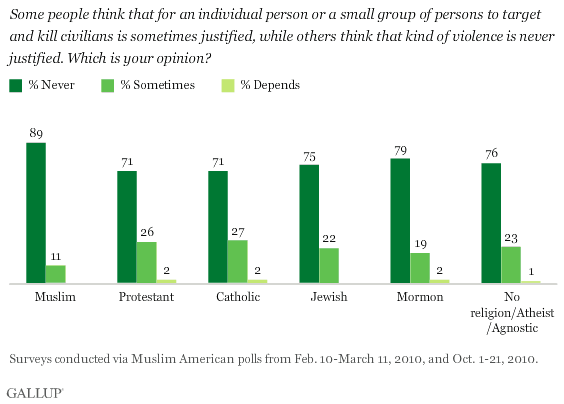There is a common narrative in the West that Islam is more violent that other religions. I want to is complicate this overly simplistic—and, frankly, wrong—narrative. It is absolutely true that some Muslims use Islam to justify violence, but those who use this to tie Islam to violence are quick to erase peaceful Muslims (who don’t tend to make the news) and quick to ignore violence perpetrated by the West. In this post I will look at justifications of violence against civilians, human rights abuses, and religious violence.
Now first of all, we need to remember that Islam and the Middle East are not synonymous. In fact, less than 20% of the world’s Muslims live in the Middle East and North Africa combined.

Now that we’ve got that out of the way, let’s move on.
Justifying Violence against Civilians
First, critics of Islam often cite statistics on the number of Muslims who believe suicide bombing is justified. See the following, for example:
However, they generally fail to compare these numbers to Americans’ own attitudes toward targeting civilians. A 2011 Gallup poll conducted in the U.S. can give us some pointers, as it broke down Americans’ attitudes toward targeting and killing civilians by religious adherence.
First, 58% of Protestants and Catholics and 43% of nonbelievers believe the military targeting and killing civilians is sometimes justified.

Similarly, 26% of Protestants, 27% of Catholics, and 23% of nonbelievers believe it is sometimes justified for an individual or group of people to target and kill civilians.

If you look at the graphs above, you may notice that Muslim Americans are less likely to support individual or state violence against civilians than are other Americans. In fact, as you may recall from the first graph in this post, Indonesian and Pakistani Muslims are more likely than Protestant, Catholic, Mormon, Jewish, and nonreligious Americans to believe that violence against civilians is never justified. In other words, it appears that Americans are more ready to justify targeting civilians than are many of the world’s Muslims.
Human Rights Violations
Next, critics of Islam often also talk about human rights abuses in Muslim countries. It is indeed true that some Muslim countries have very serious human rights violations, and these absolutely need to be called out. But are we willing to take a good, long look at our own nation’s human rights violations?
The United Nations Human Rights Committee issued scathing report today castigating the United States’ record on a wide range of issues, including counterterrorism operations, immigrants’ rights, voting rights, and the criminal justice system.
Here are some excerpts from this report, which was released last March:
Targeted killings using unmanned aerial vehicles (drones)9. The Committee is concerned about the State party’s practice of targeted killings in extraterritorial counter-terrorism operations using unmanned aerial vehicles (UAV), also known as “drones”, the lack of transparency regarding the criteria for drone strikes, including the legal justification for specific attacks, and the lack of accountability for the loss of life resulting from such attacks. The Committee notes the State party’s position that drone strikes are conducted in the course of its armed conflict with Al-Qaida, the Taliban and associated forces in accordance with its inherent right of national self-defence, and that they are governed by international humanitarian law as well as by the Presidential Policy Guidance that sets out standards for the use of lethal force outside areas of active hostilities. Nevertheless, the Committee remains concerned about the State party’s very broad approach to the definition and geographical scope of “armed conflict”, including the end of hostilities, the unclear interpretation of what constitutes an “imminent threat”, who is a combatant or a civilian taking direct part in hostilities, the unclear position on the nexus that should exist between any particular use of lethal force and any specific theatre of hostilities, as well as the precautionary measures taken to avoid civilian casualties in practice (arts. 2, 6 and 14).—Conditions of detention and use of solitary confinement20. The Committee is concerned about the continued practice of holding persons deprived of their liberty, including, under certain circumstances, juveniles and persons with mental disabilities, in prolonged solitary confinement and about detainees being held in solitary confinement in pretrial detention. The Committee is furthermore concerned about poor detention conditions in death-row facilities (arts. 7, 9, 10, 17 and 24).—Detainees at Guantánamo Bay21. While noting the President’s commitment to closing the Guantánamo Bay facility and the appointment of Special Envoys at the United States Departments of State and of Defense to continue to pursue the transfer of designated detainees, the Committee regrets that no timeline for closure of the facility has been provided. The Committee is also concerned that detainees held in Guantánamo Bay and in military facilities in Afghanistan are not dealt with through the ordinary criminal justice system after a protracted period of over a decade, in some cases (arts. 7, 9, 10 and 14)
It’s easy to talk about the number of Muslims who believe blasphemy and apostasy should be crimes while ignoring the number of Americans who support unmanned drone strikes or keeping Guantanamo Bay open. We need to stop acting like we have a high horse from which to look down at human rights violations in Muslim countries when in fact we don’t. Do human rights violations in Muslim countries need to be addressed? Absolutely, but so do our own human rights violations. We need to be part of a holistic effort to better the world for the good of all humanity rather than spending our time focusing on an other while ignoring our own shortcomings.
There’s also the fact that our own foreign policy priorities leave something to be desired when it comes to promoting human rights. The U.S. has long been close allies with Saudi Arabia, a Muslim country notorious for its human rights abuses. If we took human rights seriously in our foreign policy, we would be putting more pressure on Saudi Arabia, as our ally, to enact reforms. Beyond this, U.S. drone strikes have been widely condemned as human rights violations, and have resulted in the deaths of hundreds of women and children. We need to think about the messages we send with our foreign policy priorities.
Religious Violence
Now critics of Islam would likely argue that the victims of American violence—whether in Pakistan or Guantanamo Bay or elsewhere—are caught up in secular military defense actions while the victims of Islamic terrorism are caught up in religious violence. This narrative is, once again, both simplistic and wrong. Islamic terrorism is not purely religious in motivation—in fact, in many cases its motivations have little to do with religion. Furthermore, U.S. military policy is not so devoid of religious influence itself as we might like to think.
The U.S. is an empire, and in the project of empire some peoples get the short end of the stick—and sometimes they bite back. Islamic terrorists are often motivated by legitimate grievances against the United States. Does that mean their actions are justified? No. But it does mean that their motivations are not fully religious—they are also political. In many cases they are best thought of as insurgents, organizing themselves into paramilitary groups and associations to strike against superior military forces, often in occupation settings.
Furthermore, not all victims of U.S. violence are guilty of waging war against the United States. We de facto classify every male of fighting age killed by unmanned drone strikes as an enemy combatant, and there are people imprisoned in Guantanamo for years who have turned out to be innocent. Over 100,000 Iraqi civilians died during the invasion and occupation of Iraq, and hundreds of Pakistani civilians have been killed in drone strikes. Malala Yousafzai herself has asked Barack Obama to halt the unmanned drone strikes, but to no avail.
Finally, it’s hard to deny that there is a religious component to our foreign policy. We are a predominantly white, Christian nation. Those in the Middle East are predominantly brown and Muslim. This can’t help but shape our view of this region, this conflict, and our place in the world—especially given the historical conflict between these two religions. Atheists like Bill Maher and Sam Harris are quick to call attention to the role religion plays in our nation’s politics, but when they speak of religious violence they often don’t think to ask what role Christianity may play in U.S. violence overseas.

We need to not have double standards. We need to not paint Islam as especially violent when Americans are just as likely to believe violence against civilians is sometimes justified and when the United States is itself guilty of a great deal of violence, both in the past and in the present. Rather than stereotyping Muslims or Islam as especially violent and exempting ourselves from analysis altogether, we need to work in a holistic way to decrease violence and combat human rights abuses wherever they occur. And of course, our primary responsibility is our own backyard.
















